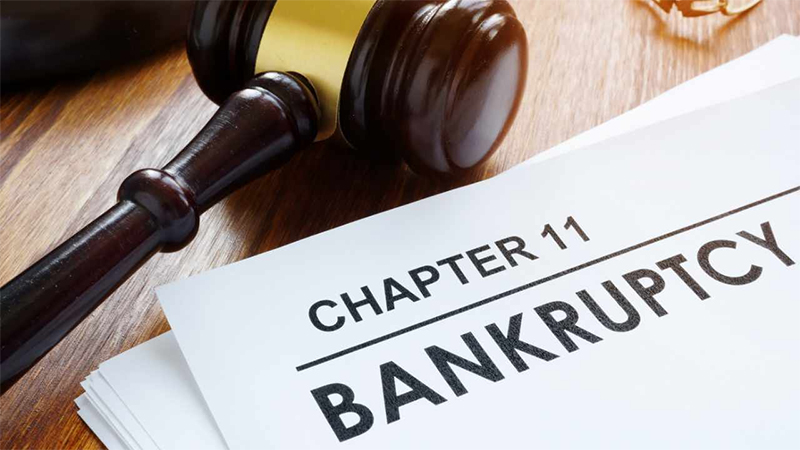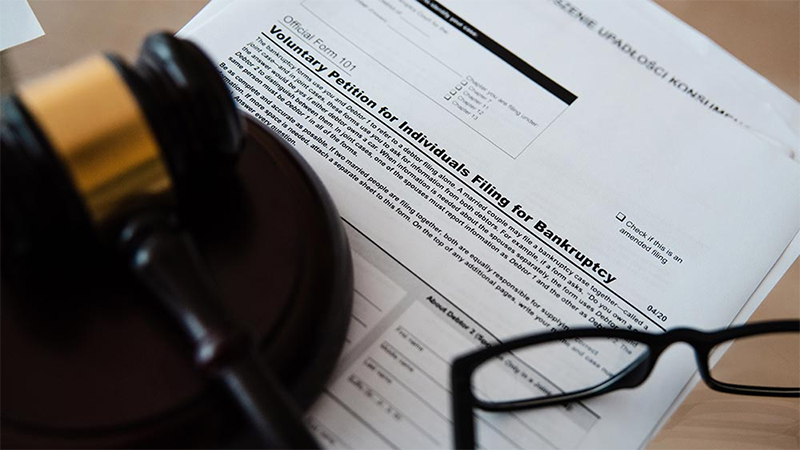Definition of Bankruptcy
Bankruptcy is a legal process that allows individuals or businesses in financial distress to resolve their debts. Filing bankruptcy provides a fresh start by eliminating or reorganizing debt under the supervision of a bankruptcy court.
Most often, bankruptcy is pursued when a person is unable to repay their creditors or when the value of their assets is insufficient to cover their debts.
There are different types of bankruptcy, and it is helpful to learn about them to know which will be best for you before filing. The two most common types are Chapter 7 and Chapter 13 bankruptcy.
- Chapter 7, also known as liquidation bankruptcy, involves the sale of non-exempt assets to repay creditors.
- Chapter 13, on the other hand, allows individuals to repay their debts over three to five years through a court-approved repayment plan.
Bankruptcy can discharge certain types of debts, such as credit card debt and medical bills, providing relief from overwhelming financial burdens. Not all debts can be discharged through bankruptcy, including student loans and tax debts. It’s also important to note that bankruptcy may have long-term consequences on one’s credit score and financial standing.
Navigating the bankruptcy process can be complex, and it may require the assistance of a bankruptcy attorney. They can guide individuals through the legal requirements, help determine the best course of action, and ensure compliance with bankruptcy laws.
Individuals may be required to attend credit counseling before and after filing for bankruptcy.
Filing for bankruptcy involves the payment of a filing fee, completion of bankruptcy forms, and providing detailed financial information, such as income and expenses, assets, and debts. This information is used to evaluate eligibility for bankruptcy and determine the appropriate course of action.
Once the bankruptcy petition is filed, a meeting of creditors is conducted, where the debtor and creditors have the opportunity to discuss the case.

Reasons to Consider Filing Bankruptcy
There are several reasons why someone may consider filing for bankruptcy.
The automatic stay provision kicks in as soon as the bankruptcy petition is filed, offering immediate relief from creditor harassment and collection efforts. This provision prohibits creditors from taking any legal action against the debtor or pursuing debt collection activities.
Bankruptcy can provide debt forgiveness. Depending on the type of bankruptcy filed, certain debts may be discharged, meaning they are eliminated. This allows individuals to obtain a fresh start, free from the burden of overwhelming debt.
Another reason to consider bankruptcy is the protection of assets. Bankruptcy laws provide exemptions that allow individuals to keep certain assets, such as a home or vehicle, while still resolving their debts. This can help prevent foreclosure or repossession in some cases.
Types of Bankruptcy
There are different types of bankruptcy, each with its own set of rules and qualifications.
Chapter 7 bankruptcy, also known as “liquidation bankruptcy,” is the most common type. It involves the sale of nonexempt assets to pay off creditors, with the remaining debts typically being discharged.
This type of bankruptcy is often suitable for individuals with limited income and significant unsecured debt, such as credit cards and medical bills.
Chapter 13 bankruptcy, on the other hand, is a form of “reorganization bankruptcy.” It involves creating a repayment plan to pay off creditors over a three to five-year period. [1]
This option can be helpful for individuals who have a regular income but struggling to meet their financial obligations.
Business entities, such as corporations or partnerships, may file for Chapter 11 bankruptcy. It allows the business to restructure its debt and develop a plan to continue its operations and repay creditors. [2]
This type of bankruptcy is most commonly utilized by large businesses seeking to remain operational despite financial challenges.
Before filing for bankruptcy, it is important to consult with a bankruptcy attorney to determine which type of bankruptcy is appropriate for your situation. Each type has its own unique requirements, eligibility criteria, and consequences.

Pre-Filing Requirements
Before filing for bankruptcy, there are several important requirements and considerations to keep in mind. Understanding these pre-filing requirements is key to ensuring a smooth bankruptcy process and maximizing the benefits it can provide.
- Attend the Meeting of Creditors: After filing the bankruptcy petition, you will be required to attend a meeting of creditors, also known as a 341 meeting. During this meeting, the bankruptcy trustee, creditors, and your attorney will have the opportunity to ask questions regarding your financial situation. It is important to be prepared and provide truthful and accurate answers.
- Choose the Right Type of Bankruptcy: Understanding the different types of bankruptcy available and choosing the right one for your situation is essential. Chapter 7 bankruptcy allows the discharge of unsecured debts, while Chapter 13 involves creating a repayment plan to pay off debts over a specific amount of time. Working with a bankruptcy attorney can help you determine which type of bankruptcy is best suited to your circumstances.
- Complete the Bankruptcy Petition: Once you have gathered all the necessary documents and completed credit counseling, you can proceed with filing the bankruptcy petition. This is a formal legal document that outlines your financial situation, debts, income, and assets. It is essential to accurately and completely disclose all relevant information to avoid potential legal issues.
- Gather Necessary Documents: Filing for bankruptcy requires gathering various documents related to your financial situation. This includes tax returns, income documentation, bank statements, and a list of assets and liabilities. These documents are essential for accurately assessing your financial standing and determining eligibility for different types of bankruptcy.
- Mandatory Credit Counseling: Before filing for bankruptcy, individuals are required to undergo credit counseling from a court-approved credit counseling agency. This counseling is designed to provide information and guidance on alternatives to bankruptcy, budgeting, and managing debt. Upon completion, individuals receive a certificate of counseling, which must be filed along with the bankruptcy petition.
- Means Testing: The means test will help determine which chapter of bankruptcy you may be eligible for. It involves calculating your average income over a specific period and comparing it to the median income in your state. If your income falls below the median, you may qualify for Chapter 7 bankruptcy. If it exceeds the median, you may need to consider Chapter 13 bankruptcy instead.
Filing for Bankruptcy
Filing for bankruptcy can be a complex and overwhelming process, but understanding the key factors and requirements can make it more manageable.
Whether you are facing overwhelming credit card debt, medical bills, or other financial struggles, it’s important to be well informed before making any decisions regarding bankruptcy.

Complete the Official Documents Required for Filing
When considering filing for bankruptcy, there are several official documents that are essential to the process. These documents ensure that the bankruptcy filing is accurate, complete, and in compliance with the law.
The first document is the petition for bankruptcy, which initiates the filing and provides basic information about the debtor, including their:
- address
- contact information
- name
This document also states the type of bankruptcy being filed, whether it is Chapter 7 or Chapter 13.
There are schedules of assets and liabilities, which detail the debtor’s property, debts, and any exemptions claimed.
These schedules provide a comprehensive overview of the debtor’s financial situation and help determine how their assets and liabilities will be treated during the bankruptcy proceedings.
Schedules of income and expenses are another important document. These schedules outline the debtor’s monthly income and expenses, including details of their regular expenses like:
- housing
- transportation
- utilities
This information is important in the determination of a repayment plan or the evaluation of the debtor’s eligibility for Chapter 7 bankruptcy. [2]
A statement of financial affairs is also required. This document delves deeper into the debtor’s financial history, including information about their:
- assets
- debts
- financial transactions
- income
It provides a comprehensive picture of the debtor’s financial situation leading up to the bankruptcy filing.
A credit counseling certificate is necessary. Prior to filing for bankruptcy, debtors are required to complete credit counseling from an approved agency. The certificate confirms this completion and must be filed along with the other documents.
By ensuring the completion and accuracy of these official documents – the petition for bankruptcy, schedules of assets and liabilities, schedules of income and expenses, statement of financial affairs, and credit counseling certificate – debtors can navigate the bankruptcy process more effectively.
These documents provide a thorough understanding of the debtor’s financial situation and are essential in determining the appropriate course of action during bankruptcy proceedings.
Submitting the Forms with the Appropriate Court or Agency and Filing Necessary Fees
Before filing for bankruptcy, gather all the required bankruptcy forms, such as the petition, schedules of assets and liabilities, schedules of income and expenses, and a statement of financial affairs.
These forms provide comprehensive information about the debtor’s financial situation and are key factors in determining the type of bankruptcy and how the assets and liabilities will be handled.
There is a filing fee associated with bankruptcy. For Chapter 7 bankruptcy, the filing fee is $338. This fee can be paid in full or in installments, depending on the debtor’s financial situation.
If the debtor is unable to afford the filing fee, they have the option to apply for a fee waiver. This can be done if the household income is below 150% of the federal poverty line. If approved, the fee may be waived or reduced.
Once the necessary forms are completed, and the fees are ready, they should be submitted to the clerk’s office at the local bankruptcy court. All the required documents are included, and the appropriate fees are paid to avoid any delays or complications in the process.
By following these steps and submitting the forms to the appropriate court or agency, individuals can move forward in the bankruptcy process and work towards resolving their financial struggles.

Contact our experienced bankruptcy attorneys at Frego Law for help preparing for and filing bankruptcy. We can help you understand the process and ensure that all your paperwork is in order. Contact us today to get started.
Sources:
[1] Process – Bankruptcy Basics. (n.d.). United States Courts. https://www.uscourts.gov/services-forms/bankruptcy/bankruptcy-basics/process-bankruptcy-basics
[2] Chapter 11 – Bankruptcy Basics. (n.d.). United States Courts. https://www.uscourts.gov/services-forms/bankruptcy/bankruptcy-basics/chapter-11-bankruptcy-basics
[3] Chapter 7 – Bankruptcy Basics. (n.d.). United States Courts. https://www.uscourts.gov/services-forms/bankruptcy/bankruptcy-basics/chapter-7-bankruptcy-basics




